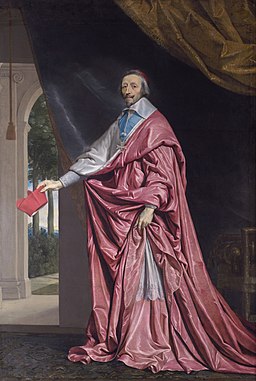Major Player: Cardinal Richelieu
 Armand Jean du Plessis, Cardinal-Duke of Richelieu and of Fronsac, sometimes called the Red Cardinal, was one of the most important political figures in French history. He’s had some pop culture fame by virtue of being portrayed as the arch-villain in Dumas’ The Three Musketeers, but the reality of his career was far more complex and morally ambiguous..
Armand Jean du Plessis, Cardinal-Duke of Richelieu and of Fronsac, sometimes called the Red Cardinal, was one of the most important political figures in French history. He’s had some pop culture fame by virtue of being portrayed as the arch-villain in Dumas’ The Three Musketeers, but the reality of his career was far more complex and morally ambiguous..
While there’s no question that Cardinal Richelieu was a villain to many, his actions and motivations were far too nuanced to truly be evil. If anything, he can be considered excessively power-hungry, ruthless and a cold-blooded realist who generally acted in France’s best interest. As the chief minister to Louis XIII, he engineered the French monarchy into a position of unparalleled power, paving the way for the absolutism of Louis XIV.
Born in relatively humble circumstances, Richelieu made a name for himself as a young man based on his abilities as an intellectual, speaker and administrator. As an eloquent advocate of the Catholic Church, Richelieu soon came to the attention of the Queen Regent, Marie de Medici, who ruled while Louis XII was still a minor. When Louis launched a coup at the age of sixteen, removing Marie and her supporters from power, it looked like Richelieu’s career was over.
But when Marie in turn launched a rebellion against her son, Richelieu was called to mediate and did so successfully, accomplishing a peaceful (though temporary) reconciliation. When the king’s principal adviser died, Richelieu was called upon to become Chief Minister and eventually, President of the Council of Ministers. Richelieu remained in this role until his death in 1642 and became indispensable to the king. They had a close, but often difficult relationship. The king both relied upon and resented the Cardinal, but ultimately supported him and his policies.
Coming to power in the middle of the Thirty Years War, Richelieu pursued a highly pragmatic and precarious policy. Spain, and by extension the Habsburg Empire, was France’s greatest opponent and Richelieu was unwavering in his action against them. A staunch Catholic, he nevertheless supported the Protestant side in the Thirty Years War, first indirectly, by funding Sweden’s entry into the war, and later directly, when France became a major participant on the Protestant side.
Within France, Richelieu cracked down on the Protestants, who had become increasingly militant and influential. He repeatedly put down Huguenot revolts within France, but ultimately allowed religious toleration, though with greater restrictions than the Protestants had previously been subject to.
At all times, Cardinal Richelieu pursued policies that strengthened French power abroad and consolidated the monarchy at home. Unsurprisingly, he had numerous personal enemies and had to fend off countless conspiracies aimed either at assassinating him or removing him from power by other means. He dealt with all of these challenges craftily and ruthlessly. He was so good at this game, it seems surprising to me that anyone dared cross him by the end of his life.
I strongly recommend Jean-Vincent Blanchard’s biography, which goes into considerable detail about this fascinating man’s political and personal maneuverings. It’s no wonder he inspired Dumas- some of his escapades were better than fiction!

Leave a Comment